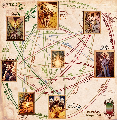Elin:Gods: Difference between revisions
The Observer (talk | contribs) m (→Relation) |
The Observer (talk | contribs) m (→Relation) |
||
| Line 105: | Line 105: | ||
Gods begin the game indifferent to the player. The relation value can be negative or positive. Turning apostate from one god to the other reduces relation by a small amount from the god one is forsaking, but has no change in relation for the god of new worship. Certain actions seem to passively change the relation with gods, but offerings change relation more actively. | Gods begin the game indifferent to the player. The relation value can be negative or positive. Turning apostate from one god to the other reduces relation by a small amount from the god one is forsaking, but has no change in relation for the god of new worship. Certain actions seem to passively change the relation with gods, but offerings change relation more actively. | ||
Attempting to convert an altar and failing or turning apostate hexes the player with a Punishment Hex which puts several very heavy weights in their inventory that cannot be dropped, making them squish to death many, many, many times. | Attempting to convert an altar and failing (200 turns) or turning apostate (9999 turns) hexes the player with a Punishment Hex which puts several very heavy weights in their inventory that cannot be dropped, making them squish to death many, many, many times. | ||
== The Pantheon == | == The Pantheon == | ||
Revision as of 01:20, 27 December 2023
Worship provides many bonuses to the player. The Gods of Elin each have their own domains and relationships with each other.
Bonuses from worship scale with how long you have been worshipping the deity in question, as well as your favor with him or her.
| God | Offering | Passive | Pet | Gift | Artifact | Bonuses |
|---|---|---|---|---|---|---|
| Eyth of Void | ||||||
| Kumiromi of Harvest | Seeds | Perception, Dexterity, Learning, Farming, Alchemy, Weaving, Literacy | Seeds are generated from rotting food. Seeds are enhanced. | |||
| Opatos of Earth | Strength, Endurance, Shield, Weightlifting, Mining, Blacksmith | |||||
| Itzpalt of Element | Magic, Meditation, Fire Resistance, Cold Resistance, Lightning Resistance | |||||
| Mani of Machine | Dexterity, Perception, Gun, Spot Hidden, Lockpicking, Appraising, Strategy | |||||
| Ehekatl of Luck | Charisma, Luck, Evasion, Magic Capacity, Fishing, Stealth | |||||
| Jure of Healing | Will, Regeneration, Meditation, Anatomy, Cooking, Magic Device, Magic Capacity | |||||
| Lulwy of Wind | Bows, Crossbows | Perception, Speed, Bow, Crossbow, Evasion, Taming | Learn the special action "Lulwy's Trick", grants speed and the strengthen blessing. | |||
| Elin of Harmony | ||||||
| Yaksha of Oblivion |
All gods can be offered Corpses, which improve favor by 1 point, regardless of freshness or weight. All gods will also accept booze as offerings for 1 favor. Each god's favored item seems to raise relation by 5 points. Additionally, some actions in the world seem to passively improve or lower favor.
Praying
The player may pray to their god once a day. Praying completely heals the player's HP and MP, in addition to training faith and a relevant stat a small amount (speed for Lulwy). Unlike in Elona, it does not cost favor.
Favor
Favor can be exchanged for goods and services.
Relation
Gods begin the game indifferent to the player. The relation value can be negative or positive. Turning apostate from one god to the other reduces relation by a small amount from the god one is forsaking, but has no change in relation for the god of new worship. Certain actions seem to passively change the relation with gods, but offerings change relation more actively.
Attempting to convert an altar and failing (200 turns) or turning apostate (9999 turns) hexes the player with a Punishment Hex which puts several very heavy weights in their inventory that cannot be dropped, making them squish to death many, many, many times.
The Pantheon
The Seven Pillars
The chief deities of Ylva: Itzpalt, Opatos, Kumiromi, Jure, Lulwy, Ehekatl and Mani (formerly Eyth). They govern large domains that impact the daily lives of Ylva's population and command most of the worship to be had.
Major Gods
Major deities of the pantheon. While not as prominent as the Seven Pillars, they hold sway over sizeable domains and have a good number of followers.
Examples of major gods are Elin of Harmony and Yakasha of Oblivion.
Minor Gods
Lesser gods of the pantheon. They govern smaller or specialized domains which the major gods have overlooked, and are worshipped by a smaller number of select peoples or professions.
Negentropy (Chaos) Gods
Some gods are bad. During previous ages of Ylva, they were defeated in holy wars and sealed away by the Seven Pillars of the pantheon. One such known negentropy god is Innos of Hatred (a.k.a Prince of Betrayal).
Noa:
"When the Seven Pillars banished the negative gods, they took away their true domain names. Instead, they bestowed upon them names that emphasize the negative aspects of their attributes. This was done to leave an impression on future generations that these were "evil" deities. Therefore, the titles and attribute names of these negative gods are expected to carry a substantial bias. For instance, the true domain of Yakasha of Oblivion might be "Memory" (Yakasha of Memory). Similarly, Innos's true domain might not be hatred, but passion or something."
(Editor note: Yakasha is not a negentropy god, but a reincarnation of one.)

